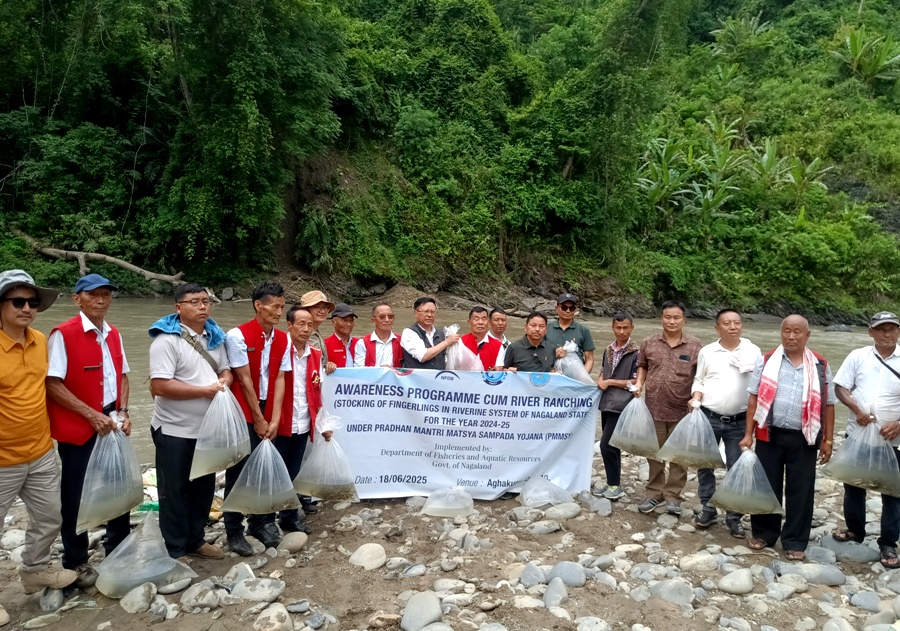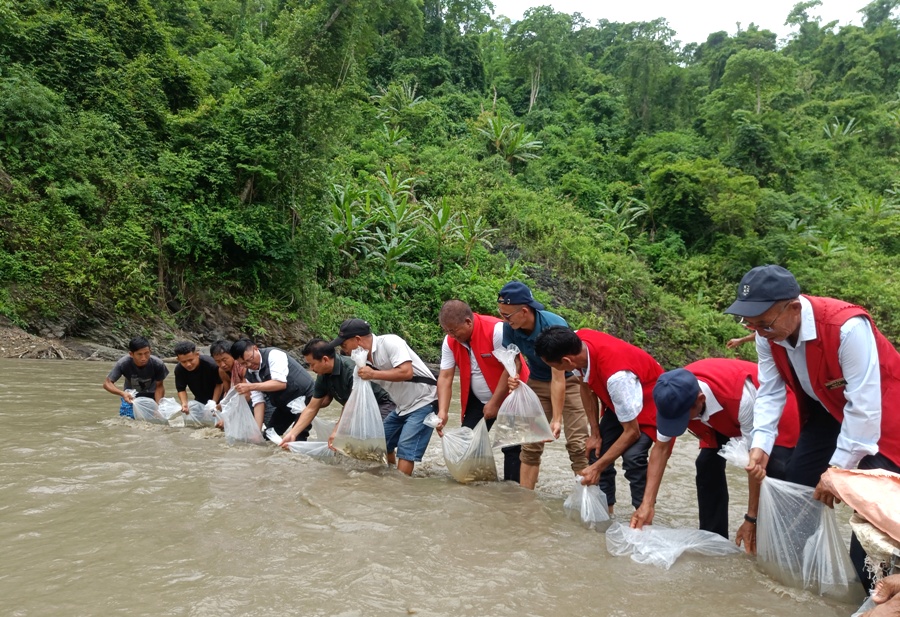SUNDAY, JULY 20, 2025
- Home
- Kikheto Sema urges Nagas to stop unethical fishing
Kikheto Sema urges Nagas to stop unethical fishing
Y Kikheto Sema urges Nagas to stop unethical fishing as over 1 lakh fish seedlings are released into the Doyang river for conservation.
Published on Jun 18, 2025
Share
More than 1 lakh fish seedlings released into Doyang

KOHIMA — Y Kikheto Sema, Principal Secretary of Fisheries and Aquatic Resources, urged the Nagas to be responsible and stop using unethical methods of fishing in rivers, such as bombs, poisons, and batteries.
He made this statement during the awareness programme-cum-fish ranching at the Doyang river, held on Wednesday at Aghakupu, Doyang.
He stated that the Nagas are very ignorant when it comes to the environment, as they casually cut down trees, hunt animals, and exploit water bodies; therefore, it is time for change.
He requested the NBCC, churches, and church leaders to follow the resolutions prohibiting hunting of forest animals and unethical fishing practices.
He also pointed out that the Nagas consume a large amount of meat and meat products, with imports to Nagaland exceeding INR 2,200 crore annually. He reminded that the Nagas spend the most money on education and meat, with INR 2,500 crore spent on education as students travel outside the state to study.
Also read: Ensure tradition and innovation walk hand in hand toward a sustainable future – TR Zeliang
He stated that the annual fish requirement is more than 14,000 metric tonnes, with about 1.4 crore kilograms of fish consumed in the state. Around 50 to 60 lakh kilograms are imported from outside, leading him to remind that, for all these reasons, “we are not sustainable”.
More than 1 lakh fish seedlings released into Doyang
In a conservation effort, more than 1 lakh fish seedlings were released into the Doyang river during the programme organised by the Department of Fisheries and Aquatic Resources, Nagaland.

Joint Director of Fisheries and Aquatic Resources Ketusielie Angami stated that due to unethical fishing, fish populations are declining rapidly. He said the initiative aims for stock conservation.
Kikheto also led an oath-taking ceremony with the village leaders of Philimi and Tsungki villages to refrain from using bombs, batteries, and poisons for fishing and to follow the guidelines and rules of the state government. He also requested the leaders to pass resolutions to stop the community from using unethical fishing methods, even if fishing cannot be completely stopped.
Ronsennungba, Director of Fisheries and Aquatic Resources, expressed that due to human greed and overexploitation, fish are disappearing before they are fully grown. He said the awareness programme contributes to the campaign for global conservation.
Read more: Nagaland launches drive targeting over 9 lakh beneficiaries under DA-JGUA scheme
He stressed the need for village authorities to strengthen conservation efforts and highlighted the benefits of conserving fish. He also mentioned that the department is undertaking more initiatives in different districts in the coming days and said they will cover all districts with water bodies in the next phase.
Urging the community not to damage the health of the river, as its environment is important for fish growth, he requested a complete ban on fishing during June, July, and August, the breeding season. Even during other times, he encouraged the use of fishing nets and other sustainable methods.
Speaking about awareness of fish ranching, Dr. Rongsenkumzuk, Deputy Director, said that the quantity of fish seedlings does not matter; the main purpose is to create awareness and promote river ranching. He said their target is to educate councils and village leaders and then raise awareness among villagers.
Stating that the council’s responsibility is to create strict rules and regulations, he said the success of the project depends on the village leaders. He added that, on an experimental basis, they are implementing the project in different areas and said the department will continue to prioritise and support those who take greater responsibility.
He asked the community to understand fish movements and not disturb their breeding grounds, but to conserve the area instead.
During the programme, Vikikhe Assummi, head GB of Philimi Village, in his short speech assured that steps would be taken to support the initiative, and Janthungo Kikon, chairman of Tsungki Village Council, thanked the government for assisting the union with the initiative.

